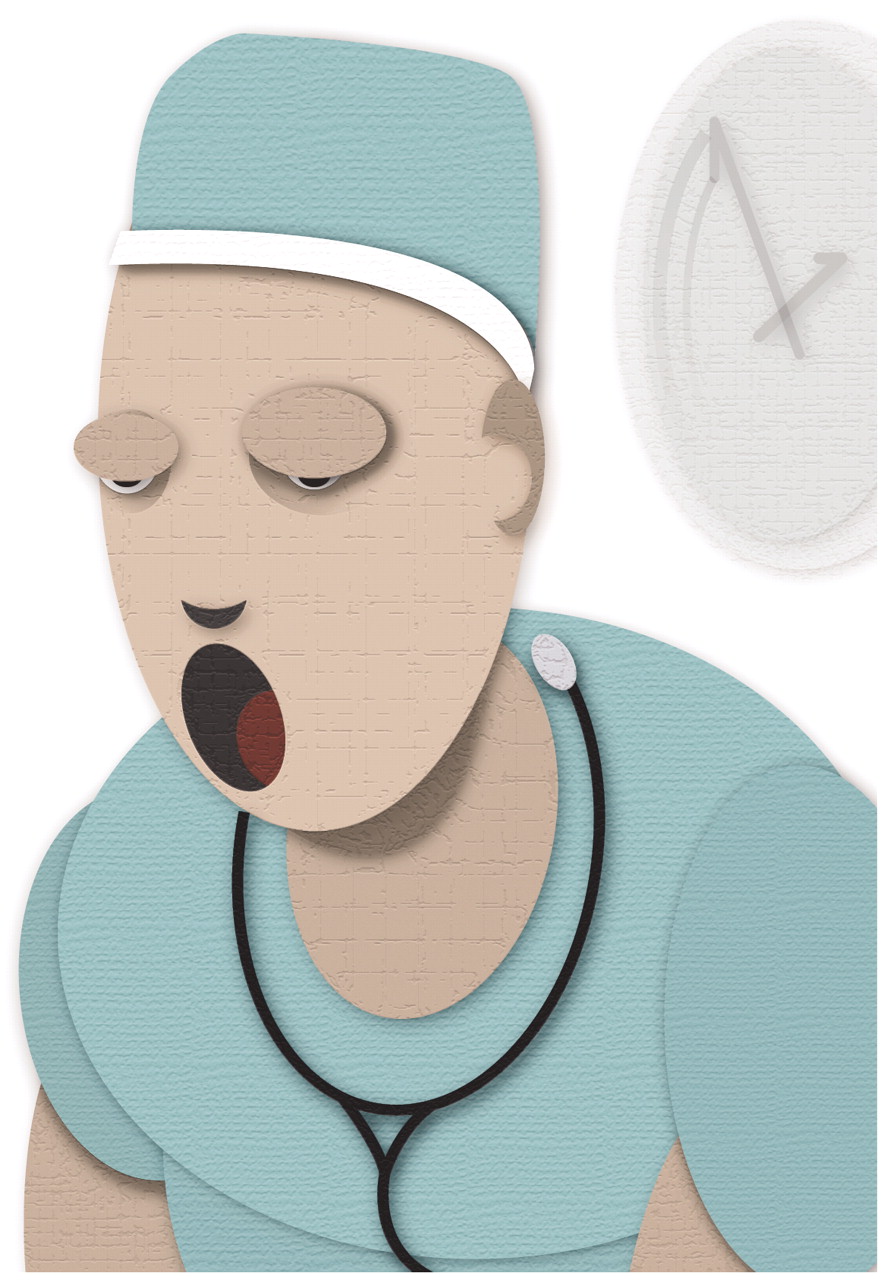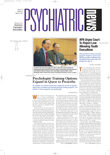Resident physicians in all specialties averaged 5.7 hours of sleep a night in PGY-1, and only 13.8 minutes more a night in PGY-2, a nationwide survey shows.
Among more than 1,600 PGY-1 residents in 21 specialties, those in pathology got the most sleep, an average of 6.9 hours a night. General surgery residents got the least, only five hours. PGY-1 psychiatry residents ranked fourth highest, averaging six hours a night.
While individuals differ in their physiologic need for sleep, sleep specialists say most adults need about eight hours for optimal performance.
Dewitt Baldwin, M.D., a scholar in residence for the Accreditation Council for Graduate Medical Education (ACGME), and Steven Daugherty, Ph.D., an assistant professor of psychology at Rush Medical College in Chicago, conducted the survey. Using the AMA's graduate medical education database, they queried a randomly selected sample (15 percent) of all PGY-1 and PGY-2 residents in the United States in the 1998-99 training year. Of 5,616 eligible residents, 3,604 participated, a 64 percent response rate.
Survey participants completed a five-page questionnaire with 44 questions that required 144 separate responses regarding work hours, supervision, learning, stress, and other aspects of residency training, as well as sleep. The researchers preserved residents' anonymity.
Baldwin and Daugherty published the survey findings in Sleep in March. They reported additional correlations between sleep and work hours at the annual meeting of the Associated Professional Sleep Societies in Philadelphia in June.
On nights on call—superimposed on weekly averages—residents often sleep only two or three hours, the researchers found. Among all residents, only 15 (0.4 percent) said they averaged eight or more hours of sleep a night.
Residents who sleep less and work longer than most of their peers express the greatest dissatisfaction with their residency experience. That suggests, Baldwin and Daugherty said, “that sleep deprivation also interferes with learning, the primary purpose of residency training.”
Most residents said their work hours were too long.
PGY-1 residents said they averaged 83 hours of work a week, while PGY-2 residents said they averaged 76 hours of work a week. Nearly half of PGY-1 and one-third of PGY-2 residents said they worked more than 80 hours a week, Baldwin and Daugherty reported in Academic Medicine in November 2003.
While 72 percent of psychiatry residents averaged 60 hours of work a week, 7 percent of psychiatry residents—mainly those in high-intensity academic programs—claimed they worked an average of 106 hours a week. ACGME regulations that went into effect July 1, 2003, limit residents to 80 hours of work a week.
Few PGY-1 residents in any specialty moonlighted. About 17 percent of PGY-2 psychiatry residents did, however, averaging 29.5 hours a month at second jobs. “That shows they had the opportunity to choose to sleep, study, or spend free time with their families or on other activities,” Baldwin said in an interview.
Residents who slept five or fewer hours a night were more than twice as likely as those who slept longer to report having worked five or more times in an impaired condition. Residents who got less sleep were nearly twice as likely to report they had made a significant medical error, been named in a malpractice suit, had a serious accident or injury, or had a serious conflict with other residents, attendings, or nursing staff.
While the 80-hour rule hypothetically enables residents to get more sleep,“ it is not clear that this will be the case,” the researchers asserted. Residents make different choices about how to spend unscheduled time. Although work and sleep hours showed an inverse relationship, work hours accounted for only 10 percent of the variance in reported sleep hours.
Charles A. Czeisler, M.D., Ph.D., the Frank Baldino Jr., Ph.D., Professor of Sleep Medicine at Harvard Medical School, expects reducing work hours to increase sleep time. “The highest number of weekly work hours in the PGY-1 year resulted in 19 percent fewer hours of weekly free time, but was associated with only 4 percent fewer hours of sleep,” he noted in an editorial in Sleep in May.
“Sleep is a biological imperative,” Czeisler stressed in an interview. “It is not a matter of choice.” As work hours increase, he asserted, sleep is preserved as a greater fraction of free time. Nonetheless, since there are 168 hours in a week, people who work more than 100 hours a week can't possibly sleep eight hours a night.
Long-term effects of chronic sleep restriction are unknown, Czeisler said. Ethical considerations likely would prevent simulation of residents' schedules in the laboratory.
If validated measures confirm the higher risks of medical errors and accidents that the self-report survey findings indicate, Czeisler added,“ the medical profession will be obligated to address the risks to both patients and residents associated with chronic sleep restriction.”
Czeisler and colleagues are conducting an intensive study of sleep and work schedules in 20 PGY-1 residents a year at the Brigham and Women's Hospital in Boston. The residents keep daily work and sleep logs and complete questionnaires; their sleep is recorded polysomnographically. Observers also monitor their work performance. The second year of the study ended in June, and Czeisler said he expects to report findings late this year.
Resident physicians know no more about the benefits of good sleep than does the general public, says Kingman Strohl, M.D., a professor of medicine and director of the center for sleep disorders research at Case Western Reserve University and the Louis Stokes Cleveland Veterans Affairs Medical Center.
Some residents assert that physicians handle sleep loss better than other people or insist they can learn to cope with sleep loss. Said Strohl, “I don't believe there is any evidence to support such claims.”
Strohl and colleagues recruited 149 residents in six specialties at five U.S. academic health centers to participate in small focus groups and answer questionnaires about effects of sleep loss and fatigue. As the researchers reported in Academic Medicine in May, residents said lack of sleep impaired their ability to learn by diminishing their cognitive abilities and complex thinking. It led them to objectify patients rather than“ care” for them and prompted feelings of detachment from everyday life. Residents in nearly every focus group said sleep loss had harmed their driving ability; some reported drowsy-driving crashes.
Residents need to learn to manage their time to assure adequate sleep, Strohl said. Residency programs also need to reduce busy work that keeps residents in the hospital. It's necessary to educate not only residents but also program directors and hospital administrators, he said, about the importance of sleep and functional impact of sleep loss.
“If I were running a residency program,” Baldwin added,“ I'd cut scut work and never hold lectures in the early afternoon, when sleepiness is overpowering. I'd also have a room where residents could nap. As little as 20 minutes of sleep can rejuvenate a person for several hours.”
The American Academy of Sleep Medicine offers an online instructional module on sleep for residency training programs at<http://aasmnet.org/safer.htm>. An abstract of “A National Survey of Residents' Self-Reported Work Hours: Thinking Beyond Specialty” is posted online at<www.academicmedicine.org/cgi/content/abstract/78/11/1154?>.▪

